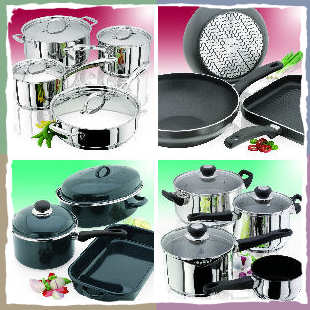Any workman can do a better job when he has the correct tools. This holds true for the cook in the kitchen as well. When buying your new equipment you will want to consider several things besides the price only.
Aluminum is probably the best for all-around utensil use. It requires a bit more care to keep it shiny and clean, but that is more than compensated for by giving even heat distribution no matter what kind of range you have. Aluminum ware is usually less expensive than some of the other kinds. It can be obtained in sheet or cast aluminum.
There are still some who may have doubts about the safety of using aluminum. It is possible that very minute quantities of aluminum may be absorbed into the food. The same thing happens with iron or copper pots. But these minerals also occur naturally in many foods. Authorities agree that these small quantities have no harmful effect.
Stainless steel is somewhat more expensive, but is easier to keep clean and shiny and will not wear out as soon as aluminum. Be sure stainless steel pots have copper, aluminum, or laminated-steel bottoms to spread the heat and keep the pots from getting dark heat spots.
Glass is good for baking in the oven, but is not practical for cooking on top of the stove.
Enamelware is not as common for cooking purposes as it once was. It must be handled carefully to prevent cracking, chipping, or discoloring.
Cast iron is sturdy for skillets, but it must be kept seasoned or it will rust. To season, spread melted shortening or salad oil (without salt) on the inside of the utensil and on its cover. Warm in oven for several hours, at low heat, swabbing sides and cover occasionally with more fat. Wipe off excess fat or oil with absorbent paper. The utensil is now ready to use. To maintain the seasoning, wash with soap only, not with detergents.
Teflon is a coating that is applied to the inside of some aluminum or steel pots and pans. It helps to prevent the food from sticking to the pot, especially when it becomes overheated. This makes the utensil easier to wash. Take care not to scratch the Teflon coating with a sharp instrument such as knife or fork. Use a wooden or plastic spatula to clean out food remnants before washing.
Here are some hints on how to care for your pots and pans:
- Keep food boiling gently so it will not boil over and leave burned food that will be hard to remove later. Gentle boiling cooks just as fast as hard boiling, and reduces chances of the pan's boiling dry and scorching.
- Do not leave griddles and skillets over the heat while you wait to put food in them.
- Lower the heat under all utensils after cooking has started.
- If you cannot wash the pans right after using them, at least rinse them. It will make washing easier later. If they need soaking, fill them with warm, sudsy water.
- Wash utensils in hot sudsy water; rinse; dry. Use a fine abrasive powder to remove all stains. To remove baked or burned-on food particles, or to scour aluminum and cast iron, use scourers such as steel wool or plastic scouring pads.
Related Posts:












 6:02 AM
6:02 AM
 figtarist
figtarist



 Posted in:
Posted in: 

